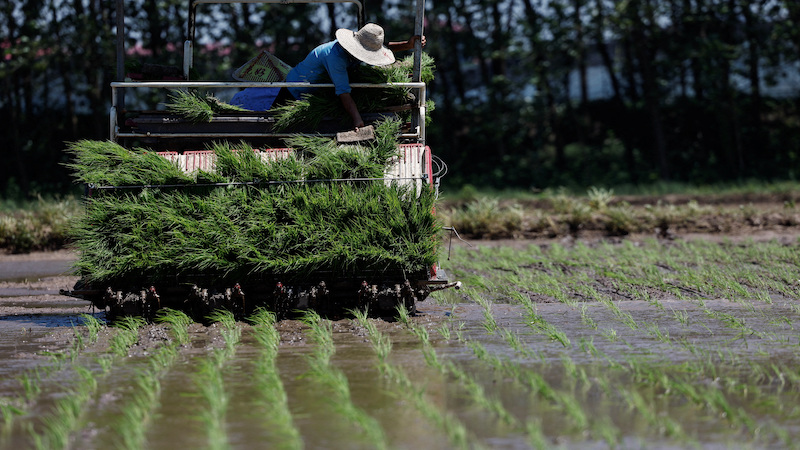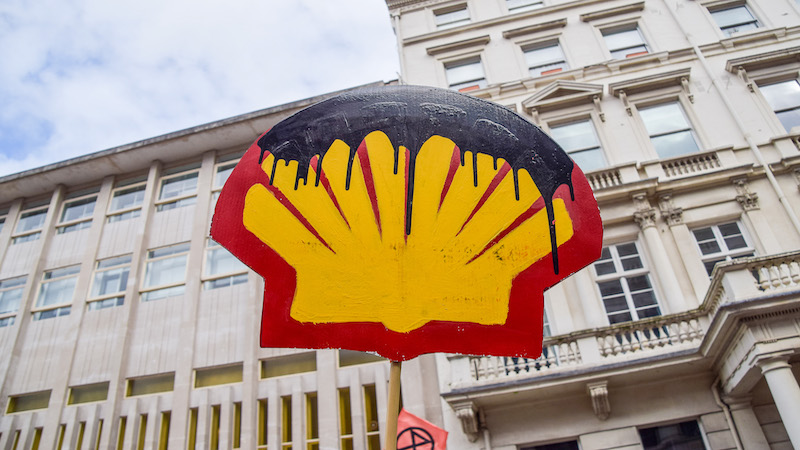The axing of Shell’s carbon offsetting schemes linked to Chinese rice farming, announced by leading carbon credit standard Verra this week, has raised questions about the process used to verify the emissions reductions from such projects.
The activities were meant to slash climate-heating emissions of methane – a potent greenhouse gas – caused by the decomposition of plants in rice fields by changing irrigation methods. But, in a 17-month review, Verra found a string of failures in the projects’ practices, resulting in the production of credits in excess of actual emission reductions.
Verra said this week it had, for the first time, imposed “significant sanctions” on the project proponents and the auditing firms tasked with certifying their operations, spurring calls from carbon market watchers for wider reforms.
In March 2023, Climate Home revealed Shell’s role in the rice farming schemes and their risk of generating worthless offsets due to integrity problems such as over-counting emissions reductions and accounting tricks used in their development.
The fossil fuel giant is directly involved in ten such projects and counted over a million credits from them towards its climate targets earlier this year, which are intended to reduce the “carbon intensity” of its fossil fuel products. Shell used those offsets while Verra was conducting its investigation, drawing condemnation from campaigners and carbon market experts.
Shell’s projects are among a total of 37 rice cultivation schemes revoked by Verra on Wednesday after the registry identified “serious issues”. These included insufficient evidence that the activities directly contributed to the reduction of methane emissions and a lack of justification for the use of simplified procedures that allowed project developers to dodge stricter compliance checks.
Late cancellation
Verra said it first suspended the projects in February 2023 after it became aware of concerns over how their rules were being applied. By then, however, they had been active on Verra’s register for nearly two years and had issued millions of credits. The project developers calculated the equivalent tonnes of carbon dioxide companies could offset based on the amount of methane emissions they estimated to have been avoided through the projects’ activities.
Asked why it originally approved the projects, a Verra spokesperson told Climate Home the organisation’s processes “evolve as new information and evidence comes in”. They added that “during that period, China’s COVID travel restrictions made it impossible to travel and perform on-site investigations”.
Fahran Ahmed, Verra’s chief program management officer, said in a statement that the standard’s announcement of sanctions showed its “commitment to ensuring greater integrity, transparency, and quality in the voluntary carbon market”.
“There are consequences for failing to follow the rules and requirements in place,” he added.
Fossil fuel transition back in draft pact for UN Summit of the Future after outcry
A Shell spokesperson told Climate Home the company was “disappointed to learn of the issues Verra identified with these projects during their recent review” and said Shell would “work closely with Verra to understand the impact of their findings”.
The spokesperson also said the projects “are not managed or operated by Shell”, although it became the “authorised representative” for them in late 2021 when it struck a series of agreements with the Chinese company that originally set up the schemes and listed them on the Verra registry.
The contracts seen by Climate Home granted Shell “full agency” over the projects, including all “applicable rights and responsibilities” equivalent to those of the project proponent. Shell declined to comment on how it carried out its responsibilities in relation to the projects.
Compensation claim
In a letter sent to a Shell subsidiary in China on Wednesday, Verra warned the company that it reserved all rights to take action, including seeking compensation for any carbon credits issued in excess of the correct amount.
In addition to using credits issued by the rice projects directly, Shell also offered them for sale to other companies for offsetting purposes. Chinese state-owned oil and gas firm Petrochina used over 300,000 of those credits before Verra’s decision to suspend the projects.

A farmer works on transplanting rice seedlings following days of heavy rainfall in China. REUTERS/Tingshu Wang
Prior to Climate Home’s 2023 investigation, the projects were listed by Shell on a dedicated webpage illustrating its carbon credits portfolio, which said the company employed “a rigorous internal screening process” to ensure it invests in activities with clear climate and environmental benefits. They were removed after the publication of the article.
Gilles Dufrasne, lead expert on carbon markets at Carbon Market Watch, said it was no surprise that Shell had been involved in carbon offsetting projects with no real climate impact. “They don’t have any credibility as an organisation in trying to do anything meaningful on climate change,” he told Climate Home.
Auditors’ failures
Washington-based Verra also identified “serious failures” in the work of four auditing firms responsible for checking the projects’ adherence to its rules and the correct measurement of emission reductions.
Verra has given the auditors 15 days to present a “strong” action plan to prevent the same issues occurring in future. Failure to do so will lead to a temporary suspension of their work with the registry.
Leaders are cutting fossil fuel finance – next comes unlocking clean energy for all
Dufrasne welcomed Verra’s decision to cancel the Chinese rice projects – but said it raises deeper questions about the agency’s overall functioning.
“There is a more systemic problem when something like this happens in the first place with 37 projects issuing bogus credits for years while auditors turn a blind eye,” he told Climate Home. “There is an excessive reliance on checks and balances that are not working properly.”
Conflicts of interest
Voluntary carbon market standards like Verra rely heavily on external auditors to independently assess projects and their compliance with the rules. The registry only gives the final stamp of approval. But auditors are picked and paid directly by project developers, raising the risk of conflicts of interest.
Dufrasne said Verra should completely reform its system of third-party certifications “with more urgency and seriousness”.
When its rice scheme investigation was launched last year, Verra also banned any further use of the rice farming methodology used by the projects.
The registry has been developing a new rulebook for rice offset projects that it said would enable proponents to “credibly achieve emission reductions” and generate high-quality credits.
To advise them on this, Verra appointed an Indian company which is part of Shell, raising concerns about conflicts of interest.
(Reporting by Matteo Civillini; editing by Megan Rowling)
